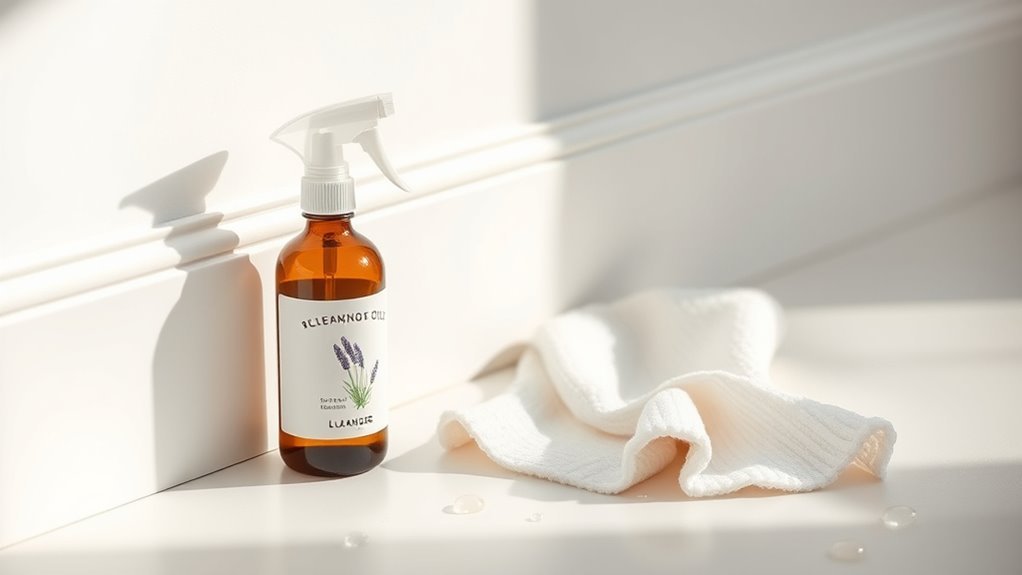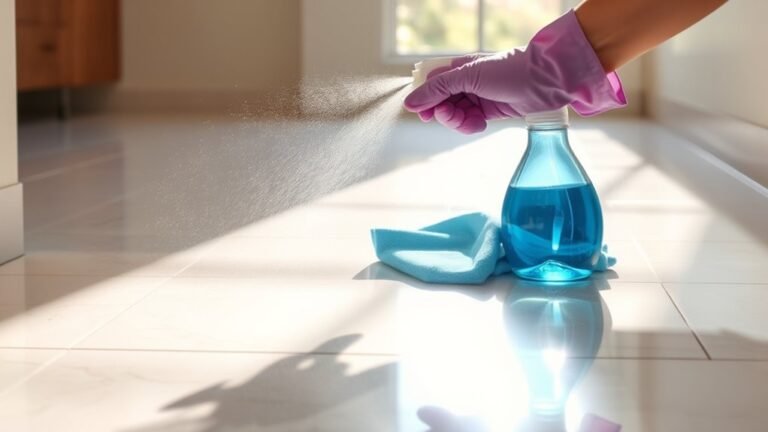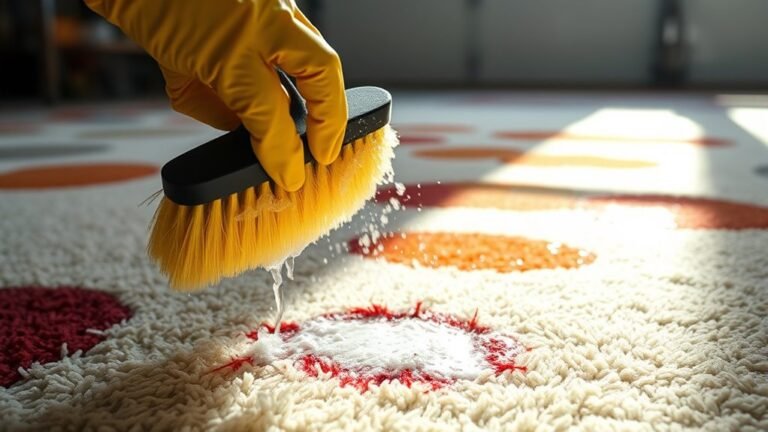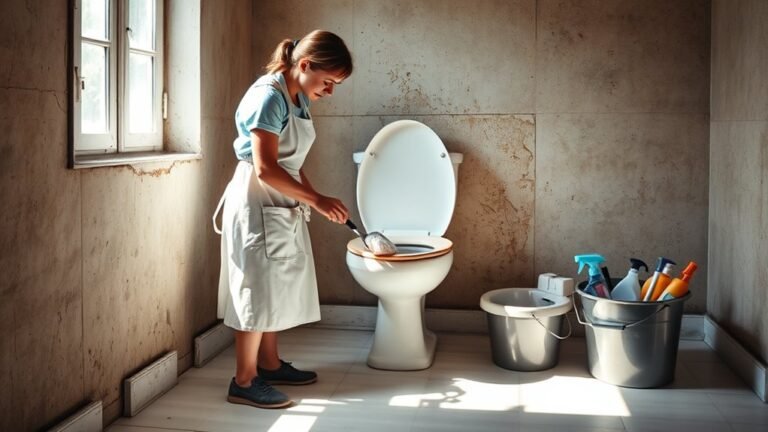Using Essential Oils to Clean Baseboards
You can easily clean your baseboards using essential oils like tea tree, lemon, or eucalyptus, which naturally fight bacteria and leave a fresh scent. Mix 10-15 drops of oil with water or vinegar in a spray bottle, then wipe with a microfiber cloth for a gentle, effective clean. Always dilute oils to protect surfaces and your skin. Adding this simple step transforms your cleaning routine, and there’s more to discover about maximizing their benefits and safety.
Benefits of Using Essential Oils for Cleaning

Although you might not have considered it before, using essential oils for cleaning offers several benefits that can make your routine easier and more enjoyable. You’ll appreciate eco friendly alternatives that protect your home and the planet, giving you the freedom to clean without harsh chemicals. Essential oils bring natural antibacterial properties, helping you tackle grime on your baseboards effectively. Plus, the aromatherapy benefits are a bonus—imagine revitalizing your space with uplifting scents like lemon or calming lavender while you clean. This simple switch lets you break free from synthetic cleaners, creating a healthier environment for you and your loved ones. Embracing essential oils empowers you to maintain a clean, vibrant home while honoring your values of sustainability and well-being.
Common Essential Oils Ideal for Baseboard Cleaning
When you’re cleaning baseboards, certain essential oils stand out for their antimicrobial properties and invigorating scents. Oils like tea tree, lemon, and eucalyptus not only help kill germs but also leave your space smelling fresh. Choosing the right essential oil can make your cleaning routine both effective and enjoyable.
Antimicrobial Properties
If you want to keep your baseboards spotless and germ-free, using essential oils with antimicrobial properties is a smart choice. When making your essential oil selection, focus on those known for their antimicrobial effectiveness, like tea tree, eucalyptus, and lemon oils. These oils naturally fight bacteria and fungi, helping you maintain a clean environment without harsh chemicals. By choosing oils with proven antimicrobial power, you’re not just cleaning—you’re protecting your home and health. Plus, they’re easy to mix with water or vinegar for a simple, effective cleaning solution. Embracing these oils lets you enjoy freedom from synthetic cleaners while ensuring your baseboards stay fresh and germ-free, making your cleaning routine both safe and liberating.
Fresh Scent Benefits
Beyond their antimicrobial powers, essential oils bring a revitalizing scent that can transform your cleaning experience. When you clean your baseboards with oils, you not only remove dirt but also leave behind a fresh aroma that uplifts your space. The subtle fragrance creates a sense of freedom and cleanliness without overwhelming your senses.
Here are some common essential oils ideal for baseboard cleaning:
| Essential Oil | Fragrance Type | Benefits |
|---|---|---|
| Lemon | Fresh, Citrusy | Energizing, crisp |
| Lavender | Floral, Soft | Calming, relaxing |
| Eucalyptus | Minty, Fresh | Invigorating, clear air |
| Peppermint | Cool, Invigorating | Uplifting, clean |
Choose the one that suits your vibe and enjoy a naturally scented, spotless home.
How to Prepare an Essential Oil Cleaning Solution

To make an effective essential oil cleaning solution, you’ll need just a few simple ingredients and tools. Start with a base like distilled water or white vinegar, which helps cut through dirt and grime. Next, choose your essential oil blends—lemon, tea tree, or eucalyptus work great for their natural antibacterial properties and fresh scents. Pay close attention to cleaning solution ratios: a typical mix is about 10-15 drops of essential oil per cup of liquid. This balance guarantees your solution is strong enough to clean but gentle enough to avoid damaging surfaces. Mix everything in a spray bottle or container you can shake well before each use. With this simple preparation, you’re ready to clean baseboards effectively while enjoying the freedom of a natural, chemical-free approach.
Tools Needed for Cleaning Baseboards With Essential Oils
Getting your baseboards spotless with essential oils is easier when you have the right tools on hand. To enjoy the freedom of a fresh, natural clean, gather cleaning tools that work seamlessly with your essential oil blends. Here’s what you’ll need:
- Microfiber cloths: Perfect for trapping dust and distributing your essential oil solution without streaks.
- Soft-bristle brush: Helps reach tight corners and textured baseboards without damage.
- Spray bottle: Ideal for mixing and evenly applying your essential oil blends.
These tools guarantee you clean efficiently, making the process quick and enjoyable. With the right setup, you’ll gain freedom from harsh chemicals and tedious scrubbing, embracing a natural, effective routine that keeps your baseboards shining effortlessly.
Step-By-Step Guide to Cleaning Baseboards With Essential Oils

Now that you have your tools ready, let’s focus on preparing the essential oil solution and the best ways to clean your baseboards. You’ll learn how to mix the oils properly to get the most effective cleaning power. Then, we’ll cover the techniques that make the process quick and thorough.
Preparing Essential Oil Solution
Mixing the right essential oils and base ingredients is key to creating an effective cleaning solution for your baseboards. To start, you’ll want to focus on proper dilution ratios—usually, 10-15 drops of essential oil per cup of water or carrier oil works well. Blending oils like lemon, tea tree, and eucalyptus not only boosts cleaning power but also leaves a fresh, invigorating scent. Here’s a quick guide to get you going:
- Use a spray bottle for easy application and even coverage.
- Combine oils with water for light cleaning or with olive oil for conditioning wood baseboards.
- Shake well before each use to guarantee the oils are evenly distributed.
This simple prep lets you clean freely, naturally, and effectively.
Cleaning Techniques for Baseboards
There are a few simple steps you can follow to clean your baseboards effectively using essential oils. First, start with baseboard dusting to remove loose dirt and debris. Use a microfiber cloth or a soft brush to gently sweep away dust. Next, mix your essential oil cleaning solution with water in a spray bottle—this eco friendly alternative breaks down grime without harsh chemicals. Lightly spray the solution onto a clean cloth, then wipe down your baseboards thoroughly. For stubborn spots, apply a bit more pressure or use a soft-bristle brush dipped in the solution. Finally, dry the baseboards with a fresh cloth to prevent moisture damage. This method keeps your home fresh, clean, and free, letting you enjoy a healthier living space.
Tips for Removing Stubborn Dirt and Grime
When you’re tackling stubborn dirt and grime on your baseboards, using essential oils can give you an effective and natural boost. To break through stubborn stains, mix a few drops of lemon or tea tree oil with warm water. This combo not only loosens grime but also leaves a fresh scent. For effective scrubbing without damaging the surface, use a soft-bristle brush or a microfiber cloth. Don’t rush—patience helps you avoid damage while getting the dirt out.
Use lemon or tea tree oil with warm water and a soft brush for natural, effective baseboard cleaning.
Here are some tips to make your cleaning easier:
- Apply the essential oil solution and let it sit for a few minutes.
- Use gentle circular motions for scrubbing.
- Rinse with plain water and dry thoroughly to prevent residue.
This approach keeps your baseboards spotless and free, just how you want it.
Safety Precautions When Using Essential Oils for Cleaning
Before you start cleaning with essential oils, it’s important to dilute them properly to avoid irritation. Make sure you handle them carefully to protect your skin and avoid breathing in strong fumes. Taking these precautions will help you clean safely and effectively.
Proper Dilution Methods
One crucial step you shouldn’t skip is properly diluting essential oils before using them to clean your baseboards. Proper dilution guarantees you get effective cleaning without risking damage to surfaces or overwhelming scents. Managing essential oil concentration is key; too strong can harm finishes, too weak might not clean well. To keep it simple and safe, remember these guidelines:
- Use a carrier like water, vinegar, or unscented soap to dilute oils.
- Stick to a ratio of about 10-15 drops of essential oil per cup of carrier.
- Always shake your mixture well before applying to distribute the oil evenly.
Skin and Respiratory Safety
Although essential oils can boost your cleaning routine, you’ll want to handle them carefully to protect your skin and lungs. Undiluted oils can cause skin irritation, so always dilute them properly before use. Wearing gloves is a smart move to shield your skin from direct contact, especially if you have sensitive skin or are prone to reactions. When cleaning baseboards, verify the area is well-ventilated to minimize respiratory sensitivity, as strong scents may trigger discomfort or breathing issues. If you notice any irritation or difficulty breathing, stop using the oils immediately and seek fresh air. By respecting these safety steps, you maintain your freedom to clean naturally without compromising your skin’s health or respiratory comfort.
How Often Should You Clean Baseboards With Essential Oils?
Keeping your baseboards fresh with essential oils doesn’t have to be a daily task. You can find a cleaning frequency that fits your lifestyle and keeps your space feeling open and free. For most, a maintenance schedule of once every two to four weeks works well to prevent dust buildup and maintain that natural scent. Adjust based on your environment and how quickly grime accumulates. Consider these points when setting your routine:
- High-traffic areas might need weekly attention
- Less-used rooms can go a month or more between cleanings
- Seasonal deep cleans keep things fresh and manageable
Combining Essential Oils With Other Natural Cleaning Agents
Deciding how often to clean your baseboards is just part of the process. To truly embrace natural cleaning alternatives, you can combine essential oil blends with other ingredients like vinegar, baking soda, or castile soap. These combinations enhance cleaning power without harsh chemicals, giving you effective and safe solutions. For example, mixing a few drops of lemon or tea tree essential oil with white vinegar creates a powerful spray that cuts through grime and disinfects. Adding essential oils to baking soda makes a gentle yet effective scrub for tough spots. By blending these natural agents, you maintain your freedom from synthetic cleaners while keeping your baseboards spotless and fresh. It’s a simple way to harness nature’s power and customize your cleaning routine.
Enhancing Your Home’s Aroma While Cleaning Baseboards
While cleaning baseboards might seem like a purely practical task, you can easily turn it into an opportunity to refresh your home’s scent. By incorporating essential oils, you’re not just cleaning—you’re engaging in aroma therapy that energizes your space. To make the most of scent diffusion while you work, try these tips:
- Add a few drops of your favorite essential oil to your cleaning solution for a subtle, continuous fragrance.
- Use a diffuser in the room while cleaning to boost mood and create a calming atmosphere.
- After cleaning, lightly mist a blend of essential oils on the baseboards to leave a lasting natural scent.
This way, cleaning becomes a moment of freedom and sensory pleasure, transforming your home into a fresh, inviting sanctuary.
Frequently Asked Questions
Can Essential Oils Damage Painted or Wooden Baseboards?
You might wonder if essential oils can damage your painted or wooden baseboards. It really depends on the essential oil types you use and the baseboard materials. Some oils, like citrus-based ones, can be harsh and may strip paint or dull wood finishes. To keep your freedom to clean safely, always test a small area first and dilute oils with water or a gentle carrier. That way, you protect your baseboards while enjoying natural cleaning.
Are Essential Oils Safe for Pets During Cleaning?
You might worry about pet safety when using essential oils, but don’t stress—they can be safe if you’re careful. Essential oil toxicity is real, especially for cats and dogs, so it’s essential to dilute oils properly and avoid strong scents like tea tree or eucalyptus. Ventilate the area well and keep pets away during cleaning. This way, you can enjoy a fresh home without compromising your furry friends’ health or your freedom to choose natural products.
How Do Essential Oils Affect Indoor Air Quality?
When you use essential oils, their aromatic properties release airborne compounds into your space. These natural scents can freshen the air and create a calming atmosphere, giving you that sense of freedom in your environment. However, some airborne compounds might irritate sensitive individuals or pets, so it’s smart to use them in well-ventilated areas. You get to enjoy the benefits while keeping your indoor air quality balanced and comfortable.
Can Essential Oils Be Used to Clean Other Household Surfaces?
Absolutely, you can use essential oils for cleaning surfaces beyond just baseboards. Their natural antibacterial and antifungal properties make them perfect for freshening up countertops, glass, and even hardwood. With essential oil uses, you get a chemical-free way to keep your space sparkling while enjoying uplifting scents. So go ahead—mix a few drops with water or vinegar, and feel the freedom of a clean, naturally scented home without harsh chemicals.
What Is the Shelf Life of Homemade Essential Oil Cleaners?
Imagine a fresh breeze trapped in a bottle—that’s how vibrant your homemade cleaners are when new. But, their shelf life usually stretches about one to three months, depending on the ingredients and storage. To keep your homemade cleaners free and effective, store them in dark, cool places away from sunlight. This way, you won’t just clean surfaces—you’ll preserve a little burst of nature’s freedom every time you reach for your spray.






